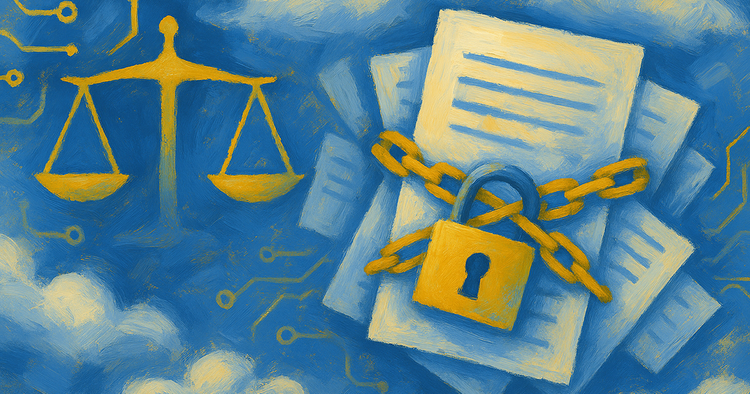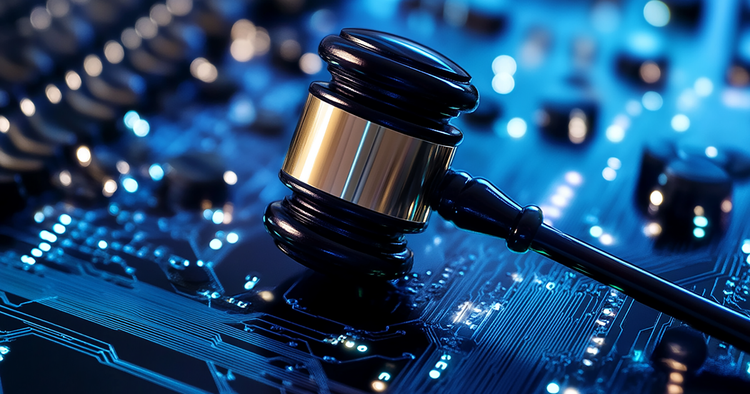The Importance of SOC 2 Type 2 Compliance for Court Reporting Technology

Cybersecurity has become a critical concern for the legal industry, with sensitive information and client trust hanging in the balance. As court reporting services increasingly rely on technology, ensuring the integrity and confidentiality of case-related information is paramount.
Selecting a court reporting vendor should be more than a logistical decision for legal professionals. Industry-recognized security standards such as SOC 2 Type 2 should be a key consideration to protect cases, reputations, and clients. This comprehensive framework assures clients that their vendors adhere to the highest data protection standards.
Understanding SOC 2 Basics
SOC 2, short for System and Organization Controls 2, sets the gold standard for ensuring a company’s data practices are trustworthy. The American Institute of Certified Public Accountants (AICPA) created this system to evaluate whether organizations safeguard sensitive information effectively and maintain robust privacy measures.
SOC 2 compliance is built on five Trust Service Criteria, each addressing a vital aspect of data protection:
- Security: Systems and data are protected against unauthorized access, disclosure, and cyber threats. Measures like encryption, firewalls, and robust authentication protocols ensure that only authorized parties can access critical information.
- Availability: Information and systems are reliable and accessible for operation when needed. This principle ensures that legal professionals can depend on uninterrupted access to essential data, even during high-demand periods.
- Processing Integrity: System processing is accurate, timely, and complete. This ensures that transcripts, exhibits, and case-related data are handled without errors or omissions that could compromise legal proceedings.
- Confidentiality: Sensitive information, such as case details and client records, is protected against unauthorized access and disclosure. Strict access controls and data compartmentalization safeguard this information throughout its lifecycle.
- Privacy: Personal information is collected, stored, and used in compliance with data protection regulations, ensuring it remains secure from unauthorized access or misuse. This principle is particularly critical in legal contexts involving private client data.
However, SOC 2 isn’t a one-size-fits-all certification. SOC 2 Type 1 provides a snapshot of an organization’s controls at a specific moment, while SOC 2 Type 2 offers a deeper evaluation, assessing how those controls operate over an extended period. This makes Type 2 particularly valuable for legal services, where long-term data integrity and confidentiality are imperative.
Achieving and maintaining SOC 2 Type 2 compliance is a meticulous and ongoing process. A vendor with SOC 2 Type 2 attestation demonstrates that its systems are continually safe and reliable. This translates into better service—secure access to sensitive transcripts, exhibits, and deposition recordings without interruptions or vulnerabilities.
Continuous monitoring and regular audits ensure systems remain resilient against evolving threats. For legal professionals, partnering with SOC 2-compliant vendors is necessary to safeguard sensitive case information and preserve trust.
The Critical Nature of Security in Court Reporting
Court reporting involves more than simply transcribing speech. Legal professionals must consider that highly sensitive legal data—for which they are responsible—is accessible to their technology vendors, including court reporting services. Transcripts, exhibits, and personally identifiable information often include intimate details of disputes, corporate transactions, or private lives, making them prime targets for cyberattacks.
In legal practice, ethical obligations demand strict confidentiality, including adherence to frameworks like the ABA’s Model Rules of Professional Conduct. A data breach could jeopardize attorney-client privilege, undermine cases, and damage reputations. According to the ABA, 29% of law firms experienced a breach in 2023, underscoring the urgency of implementing robust security protocols.
At Prevail, we recognize that protecting user data requires exceeding standard security measures. Our SOC 2 Type 2 compliance safeguards the integrity of all transcript data, which remains securely stored within our cloud-based platform rather than on individual reporters’ personal devices. This centralized approach significantly reduces the risk of unauthorized access, accidental exposure, or cyberattacks targeting distributed systems.
SOC 2 compliance for court reporting establishes trust and reduces vulnerabilities by ensuring systems are designed with security in mind, continuously monitored, and capable of adapting to evolving threats. Partnering with a SOC 2 Type 2 compliant vendor gives legal teams peace of mind, empowering them to focus strategically on delivering justice.
Securing the Future of Legal Tech
As technology pushes legal practice to evolve, data security is non-negotiable. Certifications like SOC 2 Type 2 assist legal professionals in maintaining their clients’ security, particularly as cyber threats grow more sophisticated. Clients expect assurance that their sensitive data won’t fall into the wrong hands, and vendors that fail to meet these expectations risk becoming obsolete.
The legal sector is already embracing stricter security protocols, driven by the rising costs of breaches and mounting regulatory scrutiny. Law firms and legal tech vendors can avoid these difficulties by adhering to frameworks like SOC 2. It’s a strategic advantage in an era where trust is currency.
Certifications like SOC 2 Type 2 are about meeting today’s standards and preparing for tomorrow’s challenges. Firms that prioritize security will stand out as respected leaders. As legal professionals evaluate their vendors, now is the time to ask the hard questions about security and compliance.
At Prevail, our SOC 2 Type 2 attestation underscores our dedication to upholding our clients’ trust and protecting their data and reputation. It’s not just about compliance—it’s about confidence.
Ready to learn more? Explore how Prevail can safeguard your practice today.




